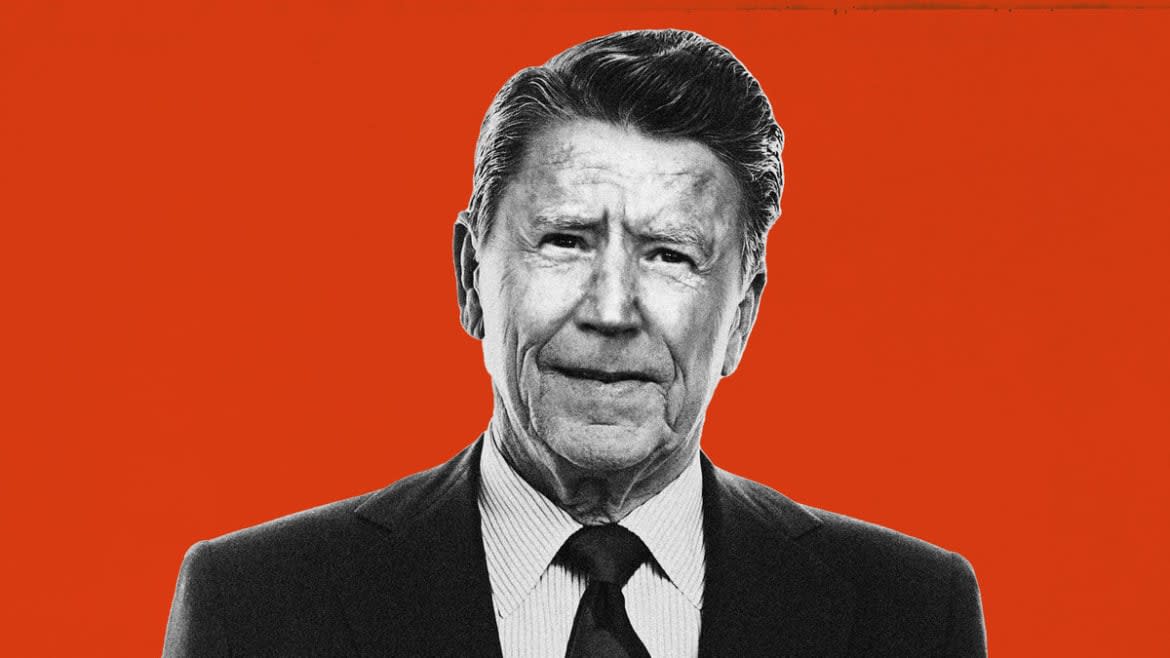The ‘Tear Down This Wall’ Moment Matters—The Walkback Doesn’t

- Oops!Something went wrong.Please try again later.
- Oops!Something went wrong.Please try again later.
- Oops!Something went wrong.Please try again later.
When I heard President Joe Biden say that Vladimir Putin cannot remain in power, I cheered. Then I wondered how long it would take for either the White House or the State Department to walk back his comment. I didn’t put a stopwatch on it, but it wasn’t long. I wasn’t surprised—I know that politics and truth are not comfortable bedfellows.
On June 12, 1987, my father Ronald Reagan stood in front of the Brandenburg Gate and said his now-famous line: “Mr. Gorbachev, tear down this wall.” His voice dripped with anger. He later told Lou Cannon that his anger was actually not at Gorbachev but at the East Berlin police who, he had found out, herded people away from the loudspeakers so they wouldn’t hear what the president of the United States had to say. Only the West Berliners, on the side where he was speaking, could hear.
Biden’s Facts Don’t Care About Putin’s Feelings
Prior to that day, the speech my father gave bounced back and forth between Peter Robinson, who drafted it, my father, the State Department, and the National Security Council. The“tear down this wall” line kept getting cut; the reasons given were that it would be a direct challenge and would damage relations with the new Soviet leader. My father kept putting it back. I don’t know for certain, but I’m guessing his opposition finally just gave up, knowing that he was hellbent on saying exactly that.
Following the speech, Henry Kissinger dismissed the idea of the wall coming down as fantasy. The State Department, while not walking back the line, put out relatively anodyne statements about working to unite East and West Germany, but pointedly did not mention the idea of tearing down the wall. Much of the media wrote off my father’s words as foolish idealism. And the Soviet news agency Tass called it “openly provocative” and “war-mongering.”
On November 9, 1989, it was announced that people in East Berlin could cross freely into West Berlin. Thousands of Germans headed to the wall with hammers and chisels. Over the next few weeks, the wall was destroyed. After its fall, there was a reevaluation of my father’s words. Time magazine said they were “the four most famous words of Ronald Reagan’s presidency.” Douglas Brinkley said it “bolstered the morale of the pro-democracy movement in East Germany.”
Biden was speaking to the world, but it seems pretty clear that he was speaking quite directly to the people of Russia–people who may or may not be able to hear his speech.
Here’s What Russia Did in Ukraine While You Were All Squabbling Over Biden’s ‘Attack’ on Putin
History is often defined by single moments in time–an action, a line spoken with the courage of conviction and an iron grip on the truth. We have all watched in horror as Vladimir Putin has committed war crimes and slaughtered civilians. Of course he shouldn’t remain in power. It’s up to Russia to make that happen, but the sentiment is an important one to give voice to.
History is also defined by people who step into the moment that’s given them and act not out of political caution, but out of moral certainty and righteous indignation at the inhumanity they are witnessing.
President Biden’s words will endure. The walk-back will fade.
Get the Daily Beast's biggest scoops and scandals delivered right to your inbox. Sign up now.
Stay informed and gain unlimited access to the Daily Beast's unmatched reporting. Subscribe now.

